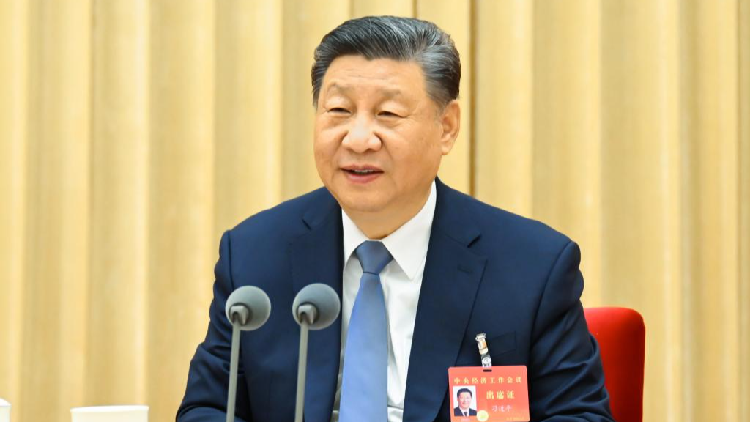At crucial meeting, China outlines economic goals for 2025
The annual Central Economic Work Conference took place in Beijing from Wednesday to Thursday, during which Chinese leaders outlined the economic agenda for 2025.

Xi Jinping, who serves as the general secretary of the Communist Party of China, president, and chairman of the Central Military Commission, delivered a significant speech during the conference.
In his address, Xi assessed the nation’s economic activities for 2024, examined the current economic landscape, and detailed plans for the following year’s economic agenda.
The meeting reported that China’s economy exhibited generally stable performance and made headway in 2024, achieving substantial progress in high-quality development. It expressed optimism that major annual objectives and tasks related to economic and social advancement would be successfully met.
The past year's developmental journey was described as remarkable, with many positive outcomes. The meeting emphasized that a series of incremental policies introduced by the CPC leadership in late September effectively bolstered social confidence and led to a notable economic rebound.
Despite acknowledging the heightened adverse effects from shifts in the external environment and the myriad difficulties still confronting domestic economic operations, the meeting insisted that the supporting conditions and the fundamental trajectory of the Chinese economy's long-term robust development remain intact.
"We must face up to the difficulties, strengthen our confidence, and strive to transform all positive factors into actual achievements in development," the meeting asserted.
The discussions called for the implementation of more proactive and impactful macroeconomic policies to maintain the upward momentum of the economy, achieve the objectives and tasks outlined in the 14th Five-Year Plan with high quality, and establish a strong foundation for the onset of the 15th Five-Year Plan.
For the coming year, maintaining steady economic growth, ensuring employment and price stability, achieving a basic equilibrium in the balance of payments, and enhancing residents' income in accordance with economic growth were emphasized as critical priorities.
The meeting underscored the need for a more assertive fiscal policy, advocating for a higher deficit-to-GDP ratio and ensuring that fiscal measures remain consistently powerful and effective.
It committed to increasing the issuance of ultra-long special treasury bonds and local government special-purpose bonds, along with optimizing the structure of fiscal expenditure.
A moderately loose monetary policy is to be employed, with potential reductions in the reserve requirement ratio and interest rates at suitable times to ensure sufficient liquidity, the meeting noted.
The gathering highlighted the necessity for improved coordination among fiscal, monetary, employment, industrial, regional, trade, environmental, and regulatory policies, as well as the nation’s reform and opening-up initiatives.
Regarding consumption, investment, and domestic demand, the meeting identified objectives for 2025 that include vigorous efforts to stimulate consumption, enhance investment efficiency, and broaden domestic demand in various areas.
A dedicated campaign aimed at boosting consumption was recommended, alongside measures designed to increase incomes and ease the financial pressures faced by low- and middle-income groups.
Enhanced promotion of large-scale equipment upgrades and consumer goods trade-in programs was suggested, along with initiatives to nurture the debut economy, the ice and snow economy, and the silver economy.
Support for the implementation of significant national strategies, enhancing security capabilities in crucial areas, and increasing central government budget investment where appropriate were also encouraged.
In terms of fostering new quality productive forces, the meeting stressed the importance of prioritizing scientific and technological innovation to cultivate a modern industrial system.
This involves forward-thinking arrangements for major technological projects, large-scale demonstrations for the application of new technologies, and launching an "AI Plus" initiative, aimed at nurturing future industries and strengthening China’s strategic scientific and technological prowess.
The meeting called for the attraction of patient capital and increased social capital involvement in venture capital while also addressing irrational competition and regulating local government and enterprise behaviors.
The necessity to thoroughly implement landmark economic reforms, enhance regulation, promote the healthy growth of the platform economy, and improve the inclusiveness and adaptability of the capital market system was highlighted.
On the topic of high-standard opening up and risk prevention, the meeting urged the expansion of high-standard opening policies and maintaining stability within foreign trade and investment, coupled with efforts to broaden pilot programs in sectors such as telecom, healthcare, and education.
It also called for effective strategies to prevent and manage risks in key areas, ensuring no systemic risks emerge.
Further efforts are required to reverse trends and stabilize the real estate market, which includes judiciously managing the supply of newly added real estate land and promoting a new model of real estate development.
Prudent measures should be taken to address risks in local small and medium-sized financial institutions.
In terms of regional development, coordinated progress in new urbanization and comprehensive rural revitalization is essential, along with the promotion of integrated urban-rural development.
The meeting underscored the importance of ensuring stable production and supply of key agricultural products, while also modernizing governance in super-large and mega cities.
Strengthening the implementation of regional strategies to enhance regional dynamics is crucial. This entails fostering new growth hubs, improving innovation capabilities in economically advanced regions, and leveraging their role as leaders in development.
On advancing the green transition and improving people’s well-being, the meeting called for intensified efforts to push for green transition across all economic and social sectors. Specific measures involve accelerating the construction of new energy sites in challenging terrains and establishing zero-carbon industrial zones.
Additionally, ensuring and enhancing people's well-being is a priority, encompassing the creation of employment support plans for key sectors and industries, urban and rural communities, and micro, small, and medium-sized enterprises.
China aims to develop supportive policies for childbirth, enhance community-supported at-home elder care, and broaden universally accessible elderly care services.
Looking ahead to next year's economic initiatives, the meeting stressed the necessity of striking an optimal balance between stable growth, stable employment, and reasonable price rebounds. All efforts must be executed promptly and effectively with adequate intensity.
A renewed focus is also needed on finalizing key tasks for the upcoming year, particularly in boosting domestic demand, especially consumer demand. Moreover, there is a call for better management of expectations and coordinated policy implementation to enhance the effectiveness of policies.
The meeting placed additional emphasis on preparing solid proposals for the 15th Five-Year Plan.
Finally, it is essential to prioritize people's well-being and security as the year concludes, while striving to maintain overall social stability.
Li Qiang, Zhao Leji, Wang Huning, Cai Qi, Ding Xuexiang, and Li Xi, all members of the Standing Committee of the Political Bureau of the CPC Central Committee, attended the meeting. Li Qiang delivered a concluding speech outlining the requirements for executing Xi’s guiding principles and ensuring effective economic operations in the forthcoming year.
Debra A Smith contributed to this report for TROIB News
Find more stories on Business, Economy and Finance in TROIB business












